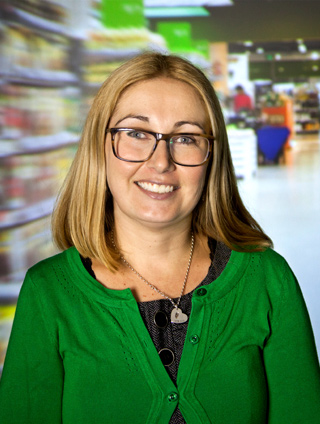Researcher Highlights
Eat well to be well
Dr Melinda Hutchesson
An authority on all things digital and dietary, Dr Melinda Hutchesson is helping young adults manage their weight by pursuing mainstream nutrition from not-so-mainstream angles.

Dr Melinda Hutchesson is an advocate for technology. The National Heart Foundation Postdoctoral Fellow is also a firm believer in the compelling influence food has on our health. Ingenious but gracious, she's marrying the two in her studies, seeking to develop and evaluate weight loss and weight gain prevention interventions that can be delivered simply, digitally and effectively.
"The goal is to improve young people's eating and exercise habits," the nutrition expert affirms.
"I use inexpensive devices that potentially have a wide reach to do this, such as mobile phone applications, websites and activity monitors."
Due to its high prevalence and disease burden, obesity is a major public health priority for this 18-35 age group.
"My findings are helping guide best practice both here and abroad."
At the same time identifying a gap in these targeted services, Melinda is devoting a sizeable chunk of her research to women.
"Statistics tell us they are putting on kilos rapidly – around six on average between their 20s and 30s," she elaborates.
"So I want to get to them early."
Move it to lose it
Melinda's career began in 2008, when she undertook a PhD at the University of Newcastle. Chiefly focused on weight loss and weight loss management, her three-year probe sought to assess the value of an online program called 'The Biggest Loser Club (TBLC).'
"It provides recipes, daily workout plans with instructional videos, a calorie-tracking diary, support from field experts, and a personalised dashboard of progress charts, graphs and feedback," she explains.
"I followed the first 11,000 participants who signed up."
"The aim was to determine whether the web-based program was successful or not."
Melinda went on to help run a larger randomised control trial of TBLC after receiving her doctorate in 2011. Funded by an Australian Research Council Linkage Grant with the University and SP Health Co, the offshoot saw the accredited practicing dietician collaborate with her PhD supervisor, Professor Clare Collins from the University of Newcastle's Priority Research Centre for Physical Activity and Nutrition.
"Part of my candidature demonstrated that young adults are particularly interested in technological weight loss interventions," she reveals.
"They need to be engaged over an extended period of time, however, and the program did not do this."
"We think it comes down to suitability – it wasn't meeting their specific needs."
"The young women in the cohort were more likely to drop out and didn't lose as much weight."
I is for innovative
Currently, Melinda is evaluating a separate strategy called 'Be Positive, Be Healthe.' Informed by an online survey, the "targeted and tailored" weight loss intervention for young women was designed with the help of Professors Clare Collins, Robin Callister, Philip Morgan and Dr Geoff Skinner and Ilung Pranata.
"It was delivered using lots of different technologies, such as through texting and Facebook," she explains.
"We wanted to demonstrate the limitless potential of these digital devices – they offer novel approaches to research and practice."
Considering the importance of giving people "what they want" where health services are concerned, Melinda is in the process of testing the feasibility of recruiting participants to the program.
A theorist as well as a practitioner, Melinda also recently published a major systematic review in top journal Obesity Reviews. Conducting meta-analyses and leading an international team of investigators, the keen lecturer looked to provide "strong evidence" to support the use of eHealth technologies.
"I then presented this work at two international conferences in 2015," she adds.
"It's one of many manuscripts I hope to contribute to in the near future."
At the coalface and the cutting edge
As sensational as her research is translational, Melinda received the Vice-Chancellor's Award for Research Excellence and Innovation (Faculty of Health and Medicine) in December this year. She plans to continue the hunt for ways to best mix the digital and the dietary, seeking to utilise a variety of technologies to replicate face-to-face interactions and interventions.
"The latter are not always possible, especially for low socioeconomic and rural or remote communities," Melinda asserts.
"I would like to see targeted eHealth strategies readily available for young adults."
"Generic programs are not enough to motivate eating and exercise behaviour changes."
The University of Newcastle acknowledges the traditional custodians of the lands within our footprint areas: Awabakal, Darkinjung, Biripai, Worimi, Wonnarua, and Eora Nations. We also pay respect to the wisdom of our Elders past and present.
